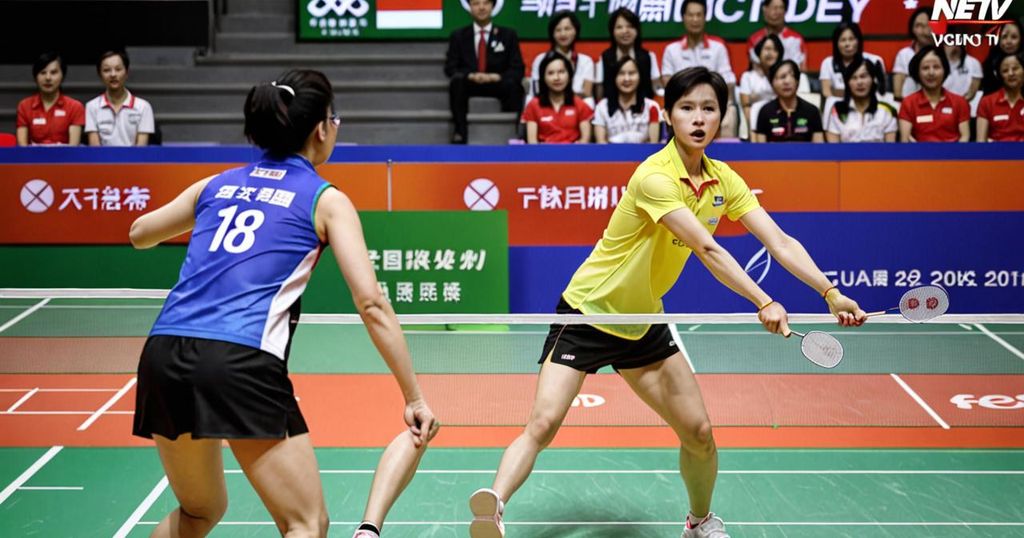Chinese State TV Cuts Broadcast as Taiwan’s Badminton Team Wins Olympic Gold
The recent triumph of the Taiwanese badminton team at the Paris Olympics has generated significant attention, particularly following the sudden termination of the live broadcast by Chinese state television as the Taiwanese duo secured the gold medal in the men’s doubles event.
Competing under the moniker of Chinese Taipei, Taiwan attained its inaugural gold medal in Paris when Lee Yang and Wang Chi-lin triumphed over the top-seeded Chinese pair. Amid the uproarious cheers and jubilation of Taiwanese fans, the historic victory was captured during the live broadcast in Taiwan. Regrettably, China’s state broadcaster, CCTV, opted to censor segments of the match in which the Taiwanese pair clearly held the advantage, much to the dismay of spectators.
This triumph unfolded against the backdrop of ongoing tensions in the Taiwan Strait concerning China’s territorial claim on the island. Despite the island’s unequivocal position and its populace’s resistance to rule by the Chinese Communist Party, the diplomatic climate remains delicate.
During the Olympics, supporters from Taiwan who displayed any symbols of the island’s statehood were targeted, as only the emblem of the Chinese Taipei team was deemed permissible by Beijing. It appeared that the event’s organizers were upholding this policy, thereby reflecting Beijing’s stance on the matter.
Immediately following the conclusion of the match, the broadcast on the CCTV16 Olympics channel was abruptly terminated, even excluding the medal ceremony and the exultant celebrations of the audience. Despite this blatant endeavor to downplay the Taiwanese victory, the passionate chants of “Taiwan!” and “Taiwan No. 1!” resonated in the air.
Furthermore, the footage and the broadcast seemed to depict biased editing, with only 40 minutes of the 76-minute match being aired. The coverage promptly transitioned to men’s gymnastics following the Taiwanese victory, further underscoring China’s attempt to diminish the achievements of the Taiwanese team.
In a noteworthy twist, the National Flag Anthem of the Republic of China was played during the podium ceremony, notwithstanding the use of the Olympic flag of the Chinese Taipei team. Meanwhile, Taiwanese fans in attendance joined in song, their resolute pride clearly audible in the uncensored live footage.
Conversely, Chinese state media reported the victory of the Chinese pair in a less detailed manner, neglecting to acknowledge the names or nationality of the pair who secured the gold medal. This omission has prompted criticism, epitomizing China’s reluctance to acknowledge the Taiwanese victory.
The incident has reignited the ongoing tensions between China and Taiwan, inciting debates and criticisms on social media platforms. The censorship and the biased reporting have also amplified the sentiments of “little pinks” – the Chinese nationalists – who voiced their discontent with the umpire’s decisions and their yearning for a unified Chinese team at the Olympics.
In light of these developments, various commentators have spotlighted China’s narrow-minded and intolerant conduct, condemning the politically-motivated actions of the state broadcaster. The attempt to control the narrative and conceal the Taiwanese victory from the Chinese audience has raised concerns about the lack of confidence and the fear of losing support among the Chinese populace.
In conclusion, the censorship of Taiwan’s badminton victory at the Paris Olympics has once again brought to the forefront the longstanding tensions and the sensitivities surrounding the cross-Strait relations, illustrating the intricate dynamics between China and Taiwan on the international stage.








Post Comment